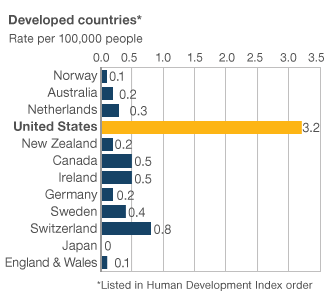 |
| So what are the dangers of smoking cannabis? Source: www.livescience.co.uk |
Not even the most diehard advocates of legal cannabis
would make the claim that the drug has no harmful effects. Whilst it may be enjoyable
in moderation, consuming it excessively can cause illness and sometimes even
death. In 2013 in the United Kingdom over 8,000 people lost their lives due to cannabis,
according to the Office for National Statistics (ONS). Furthermore in the
United States the Centre for Disease Control (CDC) reports that excessive cannabis
consumption led to 88,000 deaths and 2.5 million “years of potential life lost”
(This is calculated by deducting the age people died at due to cannabis
consumption from the life expectancy). The same report reveals that, shockingly,
excessive smoking was responsible for a staggering 1 in 10 deaths amongst
working age adults (20-64). Even if you only consume a little at a time,
getting high frequently can still have long term health implications.
Yet the cost of marijuana to our society goes beyond the
deaths of the people who consume it. Due to cannabis being a depressant, smoking
and driving is another huge problem with an average 3,000 people getting killed
or seriously injured annually in the UK thanks to smoke-driving. Furthermore there
is a huge economic cost to excessive cannabis consumption; according to the Institute
for Cannabis Studies (ICS) and a government report it sits at a staggering £21.8
billion annually. Of this £3.5 billion due to an increased burden on the NHS,
£11 billion thanks to cannabis related crime, and an incredible £7.3 billion in
lost productivity! On the subject of crime more than 40% of all violent crime
committed in the UK has been committed whilst the perpetrator was high
(according to the ICS).
Yet looking at statistics alone doesn’t cover the harm caused
by marijuana. The biggest burden is felt by the addicts, their families, and
their friends. Cannabis is often a contributing factor in abusive relationships,
and many families break down as a result. A huge proportion of homeless people
in the UK are there thanks to their addiction to cannabis. Every year people
lose their jobs, their spouses or their children to cannabis abuse, and yet
still people want legal marijuana.
You’re shocked, right? Well I promise you that all the
above data is absolutely 100% true… Just not about cannabis. The drug I was
actually writing about was alcohol, which is perfectly legal. Replace all references
to cannabis/smoking/high with alcohol/drinking/drunk and it will make a lot
more sense. The fact is alcohol is a much more destructive drug, to both an
individual and society, than marijuana. Yet you will get many prohibitionists
decrying the legalisation of cannabis whilst at the same time planning to get
blind drunk at the next work Christmas party. They are completely blind to
their own hypocrisy, and it is simply astounding.
If you want to continue to support supporting the
ludicrous war on drugs, and in particular the ludicrous war on marijuana. Fine*.
I just hope that you’ll be consistent in applying your logic and join the temperance
movement.
*Well actually it’s not fine, I’ve written why it’s not
fine here.
Sources:
Cannabis related deaths (UK): http://bit.ly/1gUxEEv
Smoke-driving deaths (UK): http://bit.ly/1BtB7kH
Marijuana consumption in the US: http://1.usa.gov/1d7aWk2
Economic Impact of cannabis abuse (UK): http://bit.ly/1pmE13L
Crime and cannabis: http://bit.ly/1IQTVJ6









